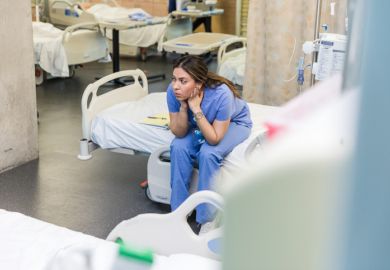It is one of the most counterintuitive aspects of science: that the most exciting discoveries in a field can be made by those coming into the area from an entirely different perspective.
Francis Crick, for example, started his scientific career as a physicist before applying his research to biology - and co-discovering the structure of DNA.
The effect is one the Medical Research Council is seeking to tap into with its so-called discipline-hopping grants.
The grants are aimed at provoking new collaborations between the physical and life sciences by allowing researchers to "hop across" the disciplinary divides and spend a short time working in another area of science. The programme, worth up to £2 million this year, funds established researchers in the physical sciences to try their hands in the biological and medical science field. Life scientists who feel they could benefit from working with physicists can also apply.
"It allows scientists to really understand how another discipline works - from the language another discipline uses to the approaches it adopts to the challenges it faces," explained Paula Clements, programme manager for interdisciplinary science at the MRC.
"Exploring it in depth can help them see potential applications for their own research ... They can go back and have that permeate their thinking and direction."
The ideal, she said, would be for established academics in the physical sciences to work alongside medical researchers. The idea is that by immersing themselves in the discipline, they develop imaginative ways of using their expertise in the new field, leading to future collaborations and larger-scale interdisciplinary research projects.
"It is pump-priming to get a really unique application of physical sciences to life sciences. A success would be if people returning to their fields then moved their research in the life sciences direction - a chemist moving to chemical biology for example," Dr Clements said.
The grants are run by the MRC in partnership with the Engineering and Physical Sciences Research Council and the Biotechnology and Biological Sciences Research Council. The Science and Technology Facilities Council and the Natural Environment Research Council will also contribute if proposals fall within their remit.
The grants have been run almost every year since 2000, but the research councils are keen for the number of applications - which must be in by 12 November - to rise.
Although it has been the standard in the past for the MRC, the EPSRC and the BBSRC each to contribute £500,000 a year to make up the central funding of £1.5 million, the pot could be increased if proposals are good.
"If applications went up, I am confident we would be able to push the total to £2 million (plus the additional contributions from NERC and the STFC). It really is an important area. We want to encourage this really powerful approach to answering scientific questions," Dr Clements said.
The grants, which are worth about £125,000 each, cover the costs of the job swap, which can be for up to a year. The grant buys out the time of a principal investigator or their research staff to enable them to go and work in the new discipline.
The programme is open to researchers in UK universities who have a proven record in their own scientific field. Fully formed project proposals are not needed, and the MRC is particularly keen to attract physical scientists to clinical and population health research.
Last year, Huw Summer did a discipline hop. The senior lecturer in the School of Physics and Astronomy at Cardiff University split his year between Cardiff's School of Medicine and a school of medicine in the US, where he worked with life scientists to probe the growth of cancer cells using optical techniques from physics.
He is now about to move to Swansea University to become a professor of nanohealth. He said it was the hop that made possible his work, which will focus on linking engineering and medical expertise in the university.
"It is why I can make the move and have some confidence that I know what I am talking about," Dr Summer said. "It (also) allowed me to change my research direction halfway through my career, which is not that easy."
Another who has made a hop is Maggie Cusack, a professor of biomineralisation at the University of Glasgow. The expert in shell chemistry is working with medical researchers at the Royal Liverpool Hospital on the chemistry of bone disease. "It is superb to really be knocked out of your comfort zone and face new challenges," she said.
See: http://www.mrc.ac.uk.



